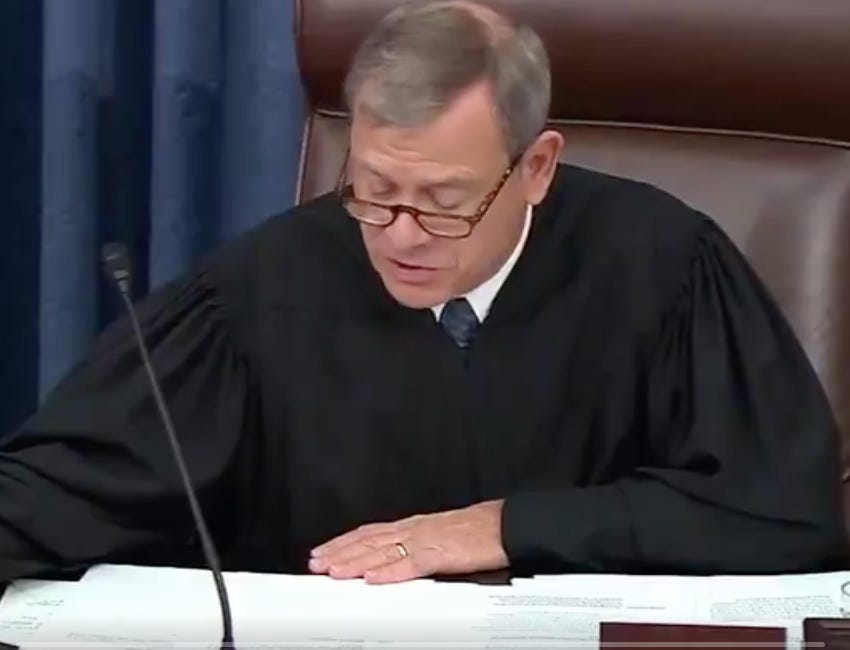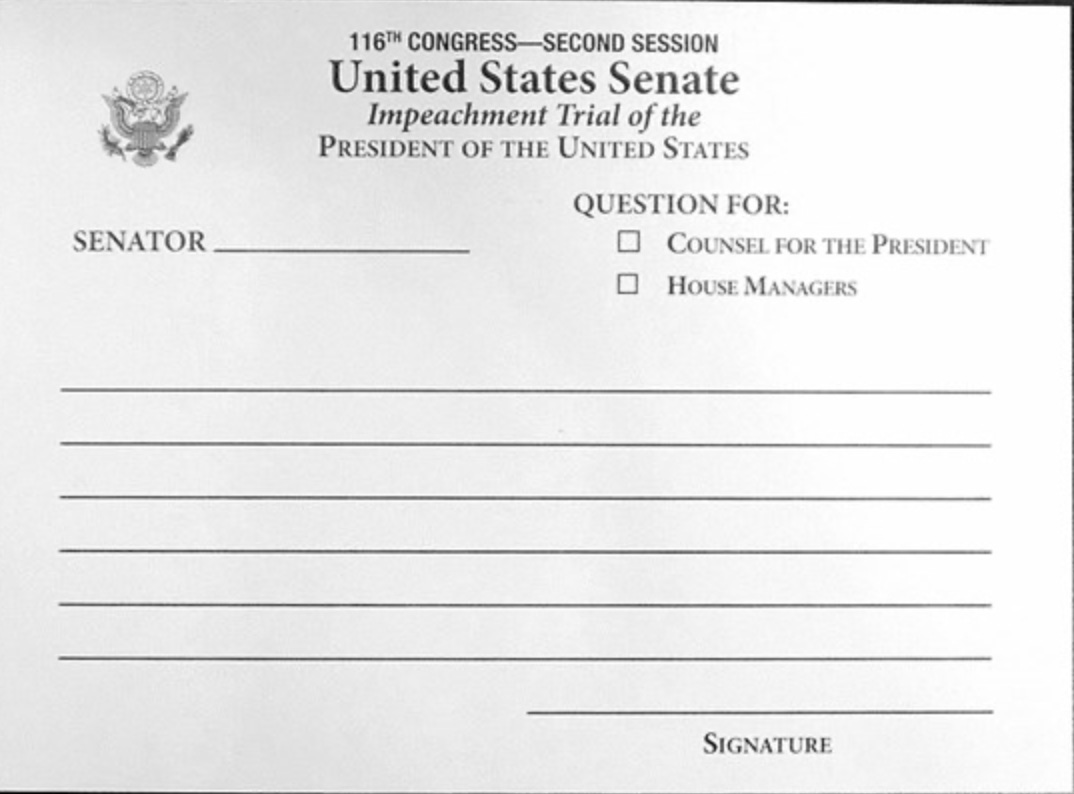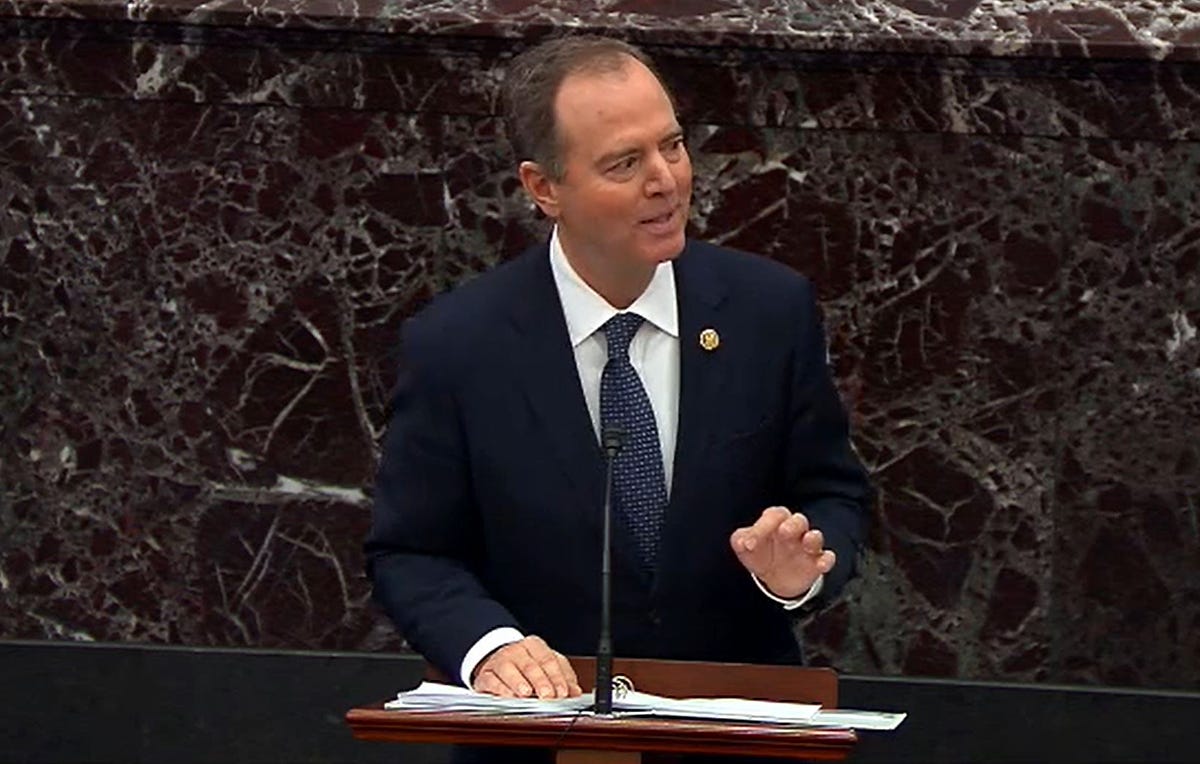Trump’s legal team has wrapped up their opening statement session of defense that seemed to go slightly off the rails once the announcement of Bolton’s manuscript details surfaced. While Cipollone and Sekulow continued to plow through their shaky statements, heavy hitters Kenneth Starr and Alan Dershowitz did little, if anything, to adjust their comments to address the Bolton bombshell that confirmed Trump’s quid pro quo. But now that the Senate question and answer session is about to begin, the tactic of ignore and deflect will not be feasible in the same way, especially in the wake of most of America demanding that witnesses be called to testify.

(Chief Justice John Roberts, explaining the question and answer portion of upcoming session, in the Senate Impeachment Trial of Donald J. Trump on Jan. 28, 2020, via screen grab of Senate video proceeding.)
The next phase of the Senate Impeachment Trial of Donald Trump will involve a series of questions, asked by both parties in the chamber and monitored by the Chief Justice. It’s reminiscent of a court trial in that the jury is able to ask questions of the witnesses, through the judge, to get clarification on the facts the trial, but courtrooms don’t have time reserved specifically for questions and the need for a jury to ask for clarification is not as common.
In today’s process, senators will have to submit questions, in writing, to the respective majority leaders of each party and the leaders will approve and submit the questions to Chief Justice John Roberts. The Chief Justice will then announce the name of each person posing the question and then read the question aloud. House Managers and defense counsel will then have five minutes to answer each question, a rule enacted previously by Chief Justice William Rehnquist. Roberts will take turns alternating between questions from Republicans and Democrats and both sides will have eight hours each, for a total of 16 hours of question time to take place over two days.
The official question cards (see below) were sent to senators early last night and only contain six lines for the question. Mitch McConnell has emphasized the importance of brevity, but has made very few other rules with regard to this session. There is also no limit on the number of questions each senator can ask and Senator Josh Hawley (R-MO) has already released the questions he intends to ask. Considering that all of Hawley’s questions focus on Schiff and his interaction with the whistleblower and Hunter Biden and his role with Burisma, the content of the questions is not being pre-scanned for relevance.

(Question card for the 116th Congress in the Impeachment Trial of Donald J. Trump.)
During President Clinton’s trial in 1998, both sides asked a total of 106 questions and it is very likely that this question and answer session could far surpass that number. While both sides will take this opportunity to clarify their legal arguments, Republicans could likely benefit from this extra time to flesh out more detail. Given their general lack of organization and clarity in opening statements, they could benefit from further explanation, if they do their jobs well. While both sides will attempt to spin politically, the five minute rule should help to condense each response and limit that kind of activity.
Once the 16 hour question and answer session concludes, both Republicans and Democrats will have two hours each to make closing arguments. Then both sides will deliberate and the Senate will vote on whether to subpoena witnesses and documents. It has been reported that Mitch McConnell (R-KY) is still unsure of where his party stands on controlling this vote as many moderates have expressed concern over the recent Bolton manuscript details and a desire to see more evidence.

(Lead House Manager, Rep. Adam Schiff (D-CA), speaking to the Senate in the Impeachment Trial of Donald J. Trump in Washington, D.C., via Getty Images.)
If the Senate votes against issuing subpoenas, Democrats could ask Chief Justice Roberts directly to intervene and subpoena witnesses. Considering Roberts’ reluctance to insert himself in the proceedings so far, this course does not seem likely to succeed. If the motion to subpoena witnesses fails the Senate could immediately move on to voting on the two articles of impeachment, where 68 votes would be necessary to remove Trump.
While this vote to remove Trump from office still seems unlikely to succeed, it is clear that the recent publication of portions of Bolton’s manuscript have moved Democrats closer to convincing senators who were on the fence that the need for witnesses is critical. Senators like Romney (R-UT) and Collins (R-ME) have been cagey all week with the media, but have indicated that the pressure to call critical witnesses like Bolton has increased. It’s also difficult to gauge where senators who have been silent with the press, but who have been affected by the latest events, stand.
For real time details about the Q&A Session in the Senate today, you can follow my Twitter feed, where I will post constant updates throughout the day.
If you like this piece and you want to support independent journalism from a female perspective, you can forward this article to others or get a subscription to Shero today. Paid subscriptions allow me to keep publishing critical and informative work that is often made available to the public, so subscribe now.
Amee Vanderpool writes the “Shero” Newsletter and is an attorney, contributor to Playboy Magazine and analyst for BBC radio. She can be reached at avanderpool@gmail.com or follow her on Twitter @girlsreallyrule.




"...convincing senators who were on the fence that the need for witnesses is critical. Senators like Romney (R-UT) and Collins (R-ME) have been cagey all week with the media,..."
There are others who are likely moveable... as in my state's (retiring) senior senator Pat Roberts. He is always cagey with media. As in, he just skirts them altogether whenever possible and, having cultivated status as a consummate back-bencher, media are too happy to oblige. I would expect, with the right pressure (and we are trying), he could be moved. The junior Sen. Jerry Moran is a lost cause, I fear.